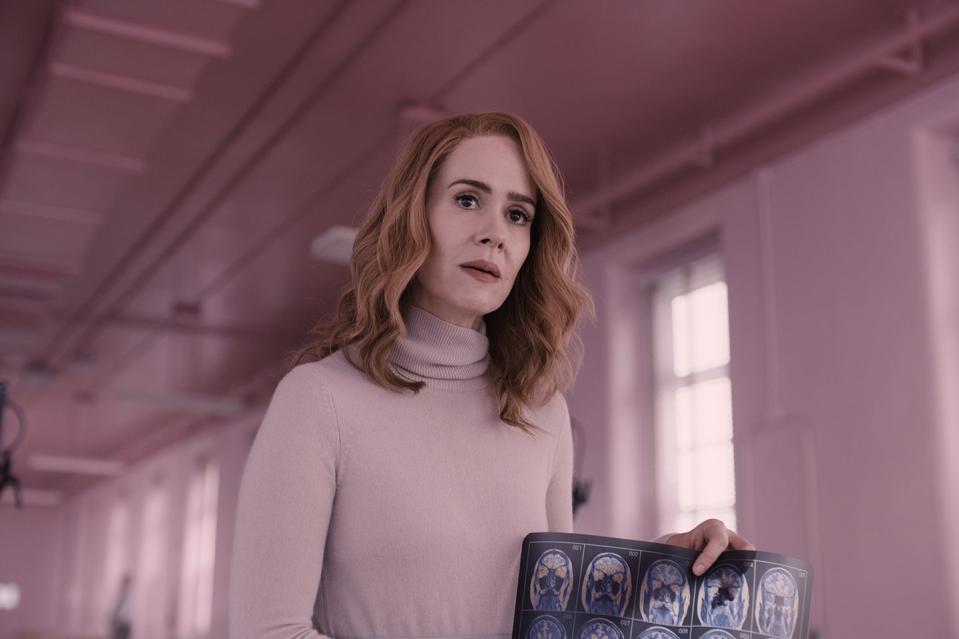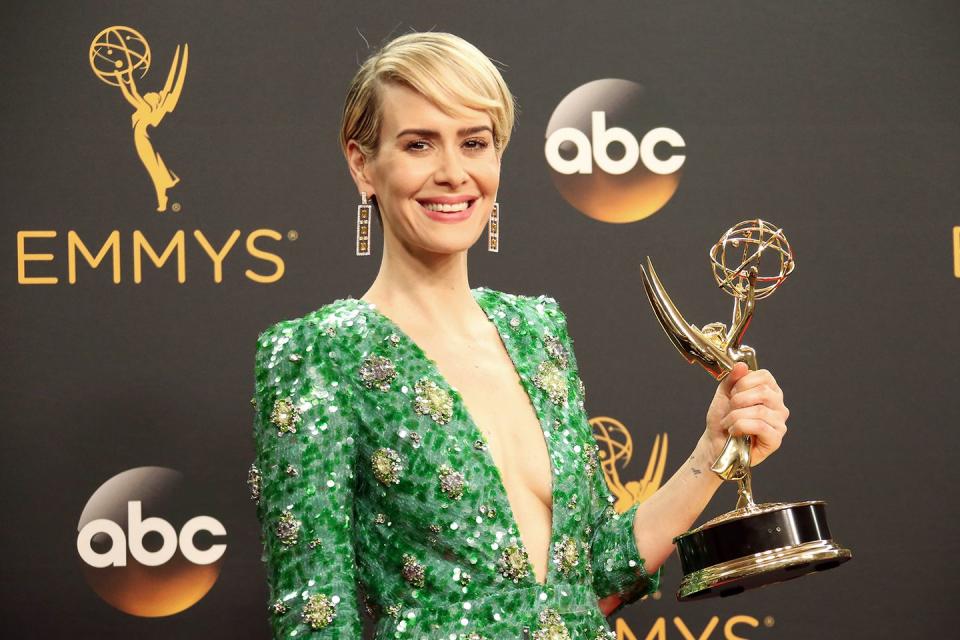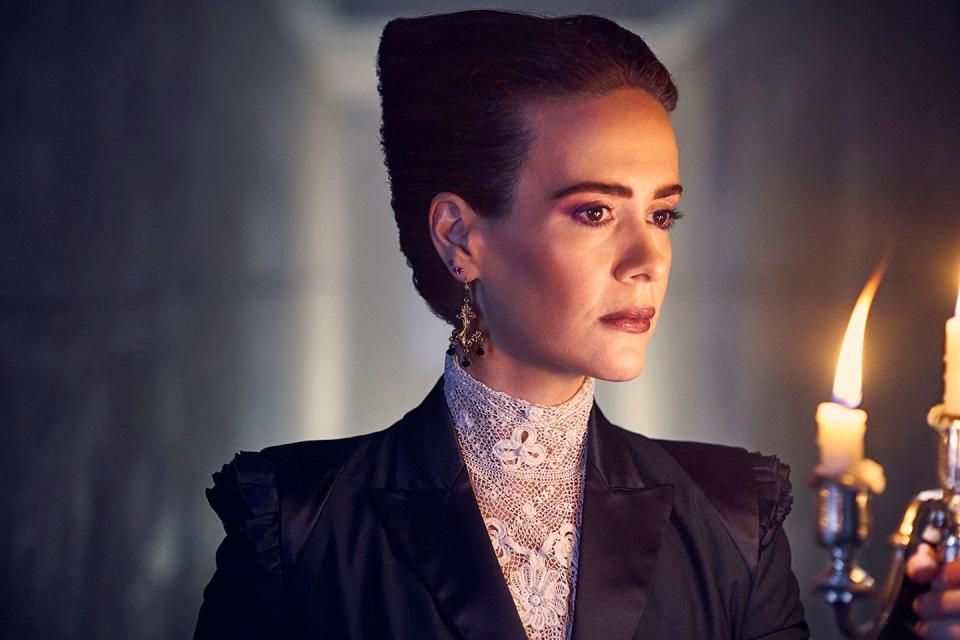Sarah Paulson: “I’m 44 years old and I’m not just playing someone’s mother or wife”

2018 was a superlative year for Sarah Paulson. She showed the mettle of women-driven cinema in the all-female Ocean’s 8 reboot; continued to rule the small screen by snagging her sixth Emmy nomination in five years; and starred in Netflix’s record-breaking phenomenon Bird Box whose success she attributes to her friend Sandra Bullock (“If you have Sandra and a good story, I think you’re destined to have something people are going to want to watch”). Next up for Paulson is the superhero movie Glass, a knotty psychological thriller from M Night Shyamalan, the film-maker behind The Sixth Sense.

Before Spider-Man started web-slinging across New York; before Thor ever raised his hammer; before the comic-book behemoth Marvel Studios even existed, there was Unbreakable, the 1990 superhero movie starring Bruce Willis and Samuel L Jackson. Unlike Iron Man or Captain America in ensuing years, Unbreakable did not shatter box-office expectations; the studio refused to even use the words “superhero” or “comic book” in its marketing campaign since, according to the director, that would’ve made the film “too fringe” and only appeal to “people who go to those conventions”. How times have changed.
Unaffected by Unbreakable’s muted reception, Shyamalan released the sequel Split in 2016, wherein James McAvoy, plagued by dissociative identity disorder, flits between his 23 personalities at a whiplash-inducing rate. Now the director is assembling his Avengers, so to speak, with Glass, a sprawling crossover that unites characters from both previous movies in a mental institution, adding Sarah Paulson into the mix as their psychiatrist Dr Ellie Staple.
McAvoy may play the shapeshifter in the franchise, but it’s Paulson who has proven her chameleonic talents throughout her career, portraying conjoined twins (American Horror Story); the derided prosecutor Marcia Clark (The People V OJ Simpson); and a steely plantation owner (12 Years a Slave). Why does she reckon superhero movies are so immensely popular nowadays? “I really think it has to do with the fact we are living in a world where what’s expected of us mentally is inflated to an almost unsustainable pace,” she tells Bazaar. “Watching these movies that are a bit fantastical can be a relief and a pause for the brain.”

“The reason this one is so much more unique and more meaningful,” she continues, “is that it’s not coming at you with all of this visual imagery of buildings being blown up and CGI. Glass engages on a more personal level, which makes it special.” She’s not wrong, the majority of the story unfolds within the sterile confines of the hospital and the movie’s biggest action sequence takes place in an unassuming car park. Much like the series’ predecessors, Glass refreshingly feels like an indie film masquerading as a blockbuster.
One notable way Glass departs from the original, however, is in terms of its superior gender representation: Unbreakable failed the Bechdel test 19 years ago and Paulson is visibly dismayed by this. “Robin Wright was so brilliant in it, but she really only had that one scene at the door when she asked him [Bruce Willis, who plays her husband] if he’d been seeing anyone,” she laments. With petitions circulating for an all-female Marvel movie and Captain Marvel poised to become a smash-hit sensation this spring, Hollywood seems to have scrapped the old adage that this genre should solely be targeting teenage boys.
“The fact that I’m in this movie and I’m 44 years old and I’m not just playing someone’s mother or wife – that in and of itself communicates that there has been forward motion.” says Paulson. “There had been a time where there really was an expiry date [for actresses]. You’d get to 40 and you’d probably have another five years maybe if you were a superstar. Otherwise good luck to you. I don’t think that’s the case any more. My career is direct evidence of that, my real success has come quite late. In my working life I have had more opportunities in front of me at this age than I’ve ever had before.”

“It can’t be denied that there has been some change,” she continues. “But I don’t think we’ve arrived somewhere where we can just go, ‘Oh, let’s exhale and sit down.’ I don’t know if that day will ever be upon us, truly. Generationally there has been a wake-up call, younger people are acutely aware of that reality and they want to ensure we never face anything like that again. In terms of this film, I’m not there to be purely someone’s love interest. That’s not even part of the story. The most defining characteristic about Ellie is her mind.”
And what a mind it is. Compared to the fidgety showboating and eruptive violence of those in her care, Ellie’s temperament appears measured, placid even. It’s only when she peels back her mask of well-reasoned concern that her calculating efforts to deceive her patients are revealed. It’s a sinister sight to behold. “Gaslighting to me is one of the most dangerous [things] because it really fucks with your personal sense of power and your personal sense of sanity,” Paulson says. “It’s incredibly destabilising. When they use some form of manipulation to make you not trust yourself or second-guess yourself it’s so lethal. But with my character, she doesn’t think she’s doing it that way. I’m not saying she’s not cognisant of what she’s doing, but she believes there’s nobility in it and a need to go through with it to give them a better life.”
Such trauma is an overarching theme in the trilogy, from bereavement in Unbreakable to sexual assault in Split. By featuring abductions, assassinations and domestic abuse, Glass is no different. I wonder how Paulson preserves her own mental health when exploring these hard-hitting subjects? “That’s an occupational hazard no matter what movie or play or television project you may be working on,” she admits. “There’s always some fun dance you have to do with your own sanity. Sometimes you’re asked to tap into things that you’ve spent a long time trying not to.”

It looks as if Paulson will continue delving into the uncomfortable recesses of her psyche for the foreseeable future. In three weeks, she will begin production on the Netflix show Ratched, where she will play the titular role in an origin story centring on the sadistic nurse from the acclaimed novel One Flew Over the Cuckoo’s Nest (a part that won Louise Fletcher the Best Actress Oscar in 1975). Paulson will then transform herself into yet another medic for the third chapter of the anthology series American Crime Story, in which she will inhabit Dr Anna Pou, the physician accused of second-degree murder during Hurricane Katrina.
The actress is undaunted by the prospect of bringing beloved literary characters and real people to life. “Something that I discovered when I was doing Marcia Clark [for OJ Simpson] was that I really like rules in my working life, because if any choice I make as an actor is possible then I don’t know which one to pick,” she says. “You’re doing the same thing with a literary character. You have places to look for research, you have the book, you have what the writer intended, you have descriptions of things that are so vivid. If I could only play people where I could really do a lot of research, I think it would probably make me a happier actress.”
Another book-to-screen adaptation Paulson has in the works is Donna Tartt’s The Goldfinch, set for release this October. To say she is a fan of the novel is an understatement. “It was probably my favourite book of the last 10 years,” she enthuses. “I sat up in bed every night and read it. I remember getting to the section Xandra was in and I said out loud, ‘If they ever made a movie of this I wanna play Xandra.’ All those years later I auditioned for it and I fought for that part.”

Looking ahead, Sarah Paulson aims to continue directing, after marking her behind-the-camera debut in 2018 with an episode of American Horror Story. “I really do want to keep doing it,” she says. “I had a very ‘safe birth’ in the sense that I was directing a show that I had been on for so many years and worked with the lot of the crew. It felt like the easiest baby step to take. It was the hardest thing I’ve ever done, and I would very much like to do it again. I don’t know if I’d direct another episode of Horror Story just to have more experiences under my belt before I take my wares out into the open marketplace.”

Up until now, Paulson’s most important roles have been on the small screen. Despite her burgeoning film career, she has no intention of cutting ties with the medium that made her name. “I remember a time when no movie star would ever do a TV show,” she says. “Now people are clamouring to be on them. I don’t really have a preference because there’s so much wonderful stuff happening in television. I feel like the plans I have are never as good as the ones that happen naturally, so I just see what comes. Even though for a control freak like me that is not an easy thing to do!” Whatever script arrives in her lap, Sarah Paulson is certain to conjure the same alchemy in her performance that has made her one of Hollywood’s most formidable character actresses.
‘Glass’ is released in cinemas on Friday, 18 January.
('You Might Also Like',)


